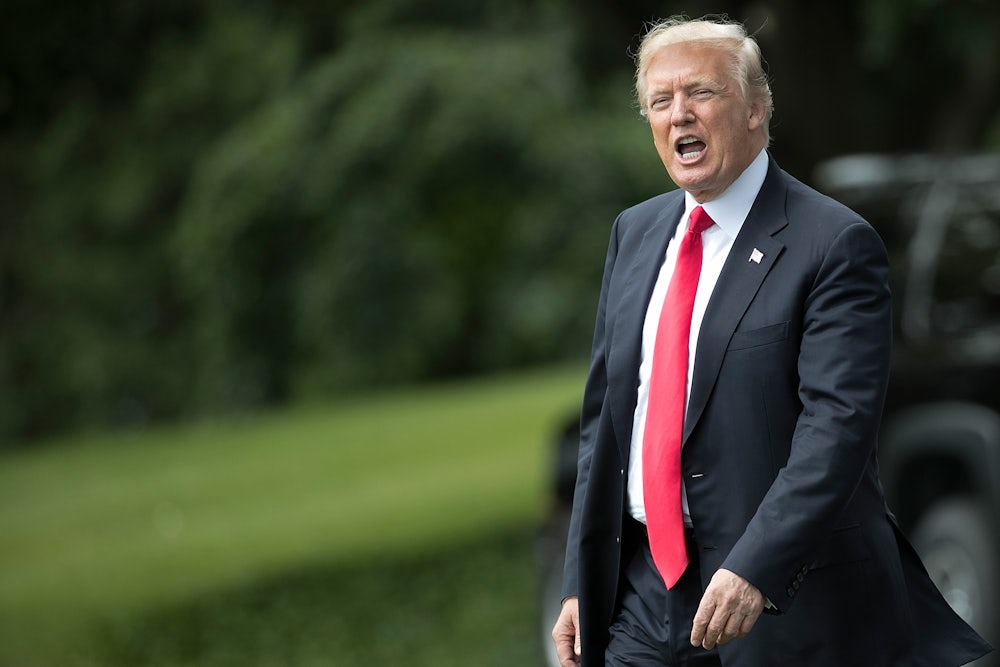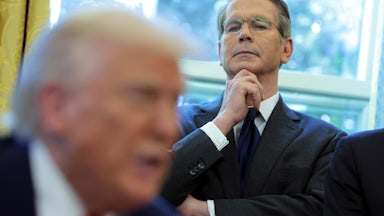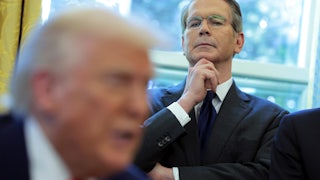Here it comes: Wednesday is “Liberation Day,” when Donald Trump plans to announce the tariff structures that will save America. Politico reported over the weekend that no one in the White House has any idea what’s going on, because it’s all in Trump’s head. Gibberish, all the same, continues to spill out of that head after sluicing its way through the oral cavity, as when he told NBC’s Kristen Welker over the weekend that he “couldn’t care less” if car prices go up.
Meanwhile—and here’s a sentence that should always make one quake in terror—the Republicans say they’re moving fast on passing their budget. The new plan is much like all the old ones, the usual garbage heap of tax cuts and spending cuts designed, as Republican budgets generally are, to punish poor and old people; its most notable feature being $880 billion in cuts to Medicaid over 10 years. Some Republicans are even acknowledging that the numbers don’t add up, which is in its way refreshingly honest of them.
Where are we headed? A recent survey of corporate chief financial officers finds 60 percent of them agreeing that we’re headed for a recession this year. Is anyone surprised? This is what Republicans do. They screw up the economy. Later down the line, Democrats get elected and have to fix everything. Then the media characterizes the economic first responders as the tax-and-spend liberal wastrels—lather, rinse, repeat. This has been happening since 1990, and it’s happened three straight times. You’d think the American people might have noticed by now.
There was a recession in 1990–91 under George H.W. Bush. Wasn’t his fault, necessarily—it was the result of the Persian Gulf War and especially the savings and loan scandal. Bush did sign into law the bill that caused that crisis; it had bipartisan backing to some extent, notably the Democratic chairman of the Senate Banking Committee. The extent to which both parties can be blamed is debatable; what is not debatable is that the true driver of the S&L debacle was neoliberal, free-market ideology.
It was a long recession, followed by a “jobless recovery.” Bill Clinton won in 1992. He passed a budget bill that raised taxes on the rich and increased public investments. Then came the dot-com boom, which Clinton did nothing to screw up. He inherited an economy that was struggling badly and left office with 22 million jobs created (a record), huge growth in median household income and the stock market—and a budget surplus. That’s case study number one.
Number two: The global economic order nearly collapsed under George W. Bush. Trillions of dollars were lost in the Great Meltdown of 2008.The causes were many, but key among them—and this comes from the Financial Crisis Inquiry Commission, not me—was excessive deregulation (one of the specialties of the house at the Chez Republican café) combined with those regulators who were still nominally on duty being asleep at the wheel. That is to say: Free-market ideology again played a role.
Barack Obama inherited an economy that was losing several hundred thousand jobs a month. It took time—perhaps more time than it should have—but he too eventually turned the economy around. He left office in 2017 with 75 straight months of job growth. That, like Clinton’s 22 million number, set a record.
Then came Trump One. For sure, the emergence of Covid-19 wasn’t his fault. But his slow, botched, and indefensible response to the pandemic that ensued was grievously destructive, both in terms of mortality and the economy. Unemployment in the United States in 2020 ballooned from 3.5 percent to 14.7 percent. It didn’t have to happen. In Germany, it went from 5 percent to 5.8 percent.
Then came Joe Biden for another rinse cycle and a righting of a sinking ship. He’s the only U.S. president to see monthly job gains for the entirety of his presidency. Wages grew impressively, and inequality decreased for the first time in decades as people in the bottom 20 percent made substantial gains.
Yes, politically, inflation hovers over these accomplishments. But it’s worth remembering two things: One, according to most economists, his policies accounted for maybe one-quarter of the inflation we saw, and two, he (and the Fed) brought inflation back down without kicking off a recession, which everyone predicted was going to happen in 2024. When he left office, two Economist writers noted that the U.S. economy “has left other rich countries in the dust.”
This was a necessarily shorthand history, but it is also an entirely accurate one. The last three Republican presidents wrecked the economy. The last three Democratic presidents had to fix things. One statistic for you. Net jobs created under Clinton and Obama: 33.8 million. Net jobs created under Bush, Bush, and Trump: 1.9 million. That is not a typo.
And with Elon Musk’s help, the next time we tot up job gains under recent GOP presidencies, we may look back on that paltry 1.9 million with nostalgia: “Remember when Republicans were merely steaming mediocrities, and not economic arsonists?”
What’s made matters worse for as long as anyone can remember, is that the Democratic presidents have had to fix things while the people who broke the economy stood around screaming at them about the deficit that they created with their immoral tax cuts and their scriptural belief in the free market.
To repeat the question I asked above: Where are we headed? Those Economist writers, last October, argued that there was every reason to expect the American economic engine to continue to roar. I wonder what they think now. And I wonder what they’ll say after Trump “liberates” the economy.
Trump’s vision is that U.S. manufacturers will repatriate their factories to avoid his tariffs. Some surely will; it’s happening to some extent now, and we shouldn’t avoid acknowledging it. But overall, manufacturers seem reluctant to do this on a big scale. It’s complicated and costly, and they never know what Trump is going to do from one minute to the next. (He’s been whiplashing between imposing steep tariffs and backing down from his own double-dog-dare-yous for the past two months.)
Then there’s the Republican ideology, as being played out in the House and Senate budgets. It has been driving the country to the brink of financial ruin for 35 years. Why should that change?
That’s a great combination: an unstable nongenius and a failed ideology that just keeps getting more and more extreme. Could it all work out fine? Economists are terrible at predicting the economy, so I’m not even going to try. I’ll just note what history suggests: that the next Democratic president will be charged with cleaning up the fourth consecutive Republic economic calamity.
When will the American people catch on? Maybe, for starters, when the Democrats start pointing it out.










